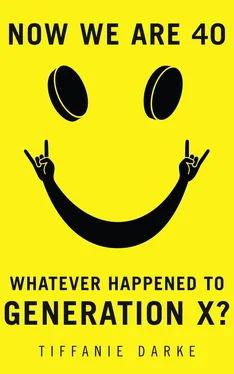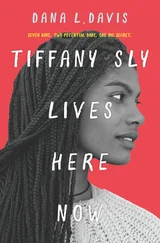Where are Generation X in all this? The generation also nicknamed ‘Middle Youth’ because we were young and cool for so long, and so good at it no one could beat us at our game. No one, that is, till those pesky digital natives came along, who were suddenly so much better at the internet and stuff, and the Recession hit, which turned the tables, and quite a few of us have kids now, which makes the pursuit of cool and youth look a tiny bit tragic. And tragic is the ultimate Middle Youth crime.
But, I would argue (particularly as I am one) – Generation X are still cool! Cool not just by a hierarchy of self-expression ranked through our fashion, music, design and friend choices. The important thing about our coolness is our irony. We fully embrace irony, in as much as we see things exactly for what they are, and we stand just a little apart from them. It makes us more knowing, and we value that. We can even do it about ourselves – we laugh at our own Middle Youthness. The only slightly self-aware Millennial is Lena Dunham. But we are Caitlin Moran, Tina Fey, Sharon Horgan, Simon Pegg, Amy Poehler and Sheryl Sandberg.
(Okay, maybe not Sandberg. One doesn’t imagine a whole lot of irony going down there. For those of you who have never read Lean In because the thought of it makes you feel tired: I am told it is a very good female tract on living and not bossy at all. I myself have ordered several copies on the internet. They are stacked, like intellectual trophies, next to my bed with all the other books I should read and don’t because I’m too busy being TATT (tired all the time) or more likely, leaning in, checking my Instagram feed. By the way, it was a Millennial who invented Instagram. Kevin Systrom. He was 26 years old.)
It is not just irony that has distinguished us, but our liberalism. Britain today is a very different place to the country we inherited 25 years ago. Yes, many people have grumbled about ‘political correctness’ along the way, but the facts are we currently have a female prime minister and female leaders of the Scottish National Party, Plaid Cymru, the Green Party and the Democratic Unionist Party in Northern Ireland. The US voted a black president into the White House and narrowly missed voting in a woman; senior political party members, heads of business and Church are now openly gay. Race, sexuality and gender politics have come a long way, thanks to us.
We have also placed a much higher value on emotional intelligence and happiness – everyone you know might be retraining as a psychotherapist, but that has given us the tools to be better behaved to our loved ones, to know ourselves a little more.
We have advanced the idea that looking after ourselves extends not just to the emotional, but the physical too. Okay, so dancing all night wasn’t quite the fitness training we wanted it to be, but we all do triathlons, bike rides and bootcamps now. We try and eat five portions of fruit and vegetables a day, we know sugar is bad, we check our breasts for lumps and men even know where their prostate is (if they haven’t actually found it yet).
We were the first to make food a mainstream cultural art form, to democratise fashion, to insist on a soundtrack, to recraft our living spaces, to search meaningfully for spirituality outside the confines of the Church, to fuel the proliferation of art, television, restaurants and nightclubs. Our love of rave went on to inspire the hip hotel trend of dressing every lobby like a chillout room, while our love of travelling has fuelled a truly globalised culture in food, fashion and design.
Our social fixes are charities like Comic Relief, Greenpeace, Amnesty International, War Child, Smart Works: organisations that actively seek to redress the inequalities in the world. This is what we care about the most. Fired by youth and entitlement, in its early years of power Generation X set out to create a world that did not judge you for your colour, your nationality, who you fancied or what sex you were. It is your values, your ideas and your thoughts that distinguish you instead.
And now, that world is beginning to look a little shaky. The year 2016 brought democratic earthquakes in the shape of Brexit and Trump that look like they may be undermining much of the progress we made and fought to achieve. And we are no longer young. We are, more or less, in our forties. And being in your forties certainly makes you look in the mirror and reflect. So this seems a timely moment for something of a calibration. Where have we come from (good times!), and where are we going (uncertain ones)? It’s hard to have a moment in front of the mirror these days that doesn’t feel tinged with nostalgia. For instance, it is rare you go ‘Look – wrinkles. What fabulous proof that I am so wise from experience and laughing so hard.’ Mostly it’s ‘Wrinkles – you bastards. Why is the Protect and Perfect not working?’ And you reach for another green juice.
The rebellion we felt in our adolescence and early youth is still there, but what are we going to do with it now? Have we really shaped society in the way we all wanted and, now we are in positions of power, how are we going to lay things down for ourselves and our children in the future?
Are we riven by midlife crisis or are we, in fact, only just coming of age? Excitingly, our best could be yet to come. As the designer Alice Temperley puts it: ‘I’ve got to the point where I feel I’ve grown up. Where I realise what’s wrong and what’s right and what’s important in life. I’ve worked hard to get to this point and now I feel poised to take it to the next stage.’
Danny Goffey, the musician once of Supergrass and now Vangoffey (Sample song: ‘Trials of the Modern Man’), points out it was not Coupland who coined the term ‘Generation X’ but Billy Idol, the musician from Middlesex who used the name for his punk band in the Seventies. Idol had sourced the title from one of his mother’s books, a study by two English journalists on Mod subculture in the Sixties. The interviews detailed a culture of promiscuous and anti-establishment youth, something Coupland saw as characterising the kids he was describing in his novel. Generation X is the child of the sixties, the child of punk. These movements before us evolved us, their values sit deep inside us.
Nowadays demographers commonly assign the X generation to those born between the Sixties and early Eighties; those after are known as Generation Y, or Millennials, and our kids are to be known as Generation Z, or Centennials (born after the turn of the century). Meanwhile our parents are the postwar generation, or Baby Boomers, born in the aftermath of the shattering devastation in the middle of the last century. Theirs has been a life of relative peace and prosperity, and they have benefited from enormous capital growth and social investment. The gap now between their experience and those of Millennials is perfectly illustrated in average income – despite being retired, Boomers have a higher income than the average working Millennial. Meanwhile it is the Millennials (and of course X-ers) who are paying those Boomers their income in the form of pensions.
What makes X-ers really interesting, though, is that we had the Nineties. The last decade before the internet hit, before smartphones connected us to everything, at every moment; the time when further education was free, housing was just about affordable, and, crucially, when wave after wave of youth culture crashed on our shores, each new wave a brilliant reaction to the one that went before. Oh kids, you missed out there. And Boomers – sorry you were too busy working to really enjoy them.
The Nineties were an adventure in cool. Out of grunge – a literal rejection of everything that came before it – came heroin chic (yes, drugs are cool – even the bad bits!), Britpop, logo-mania, Paul Smith, the Inspiral Carpets, John Galliano, Soho House, Alexander McQueen, Kate Moss, the Gallaghers, Quaglino’s, The Word , Blur, Marc Jacobs, Marco Pierre White, the Turner Prize, Loaded magazine, pickled sharks, rave, Liam ’n’ Patsy, Helmut Lang, superclubs, the Wonderbra, The Big Breakfast , Trainspotting , Chris Evans, Pulp, the Spice Girls, Tate Modern – I could go on.
Читать дальше












